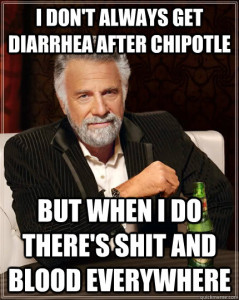Clint Rainey of Grub Street writes that in January 2016, during the throes of Chipotle outbreaks, angry shareholders slapped Chipotle with a lawsuit claiming executives had obscured the fact that quality protocols weren’t up to snuff. It argued that withholding that vital little nugget ensured that nobody could abandon the company before shares tumbled to their lowest levels in years.
 That suit’s still pending, and now a small group of shareholders have filed another lawsuit: Chipotle executives, it says, “abused their control of the Company, and dealt themselves excessive compensation worth hundreds of millions of dollars through a corrupt stock incentive plan.”
That suit’s still pending, and now a small group of shareholders have filed another lawsuit: Chipotle executives, it says, “abused their control of the Company, and dealt themselves excessive compensation worth hundreds of millions of dollars through a corrupt stock incentive plan.”
Co-CEOs Steve Ells and Montgomery Moran, CFO Jack Hartung, and other senior execs are all named in the suit:
The Company’s public statements were materially false and misleading at all
relevant times, and caused an artificial inflation of Chipotle’s stock price. During the period when the price of Chipotle stock was artificially inflated, a majority of the board of directors (and a supermajority of the Individual Defendants) engaged in lucrative insider sales, reaping millions of dollars in net proceeds.
Basically, this group of shareholders claim in the suit that executives, relying on insider knowledge about food-safety protocols, sold hundreds of thousands of shares in the first half of 2015, right before the food-poisoning scandal. Ells banked $78 million after selling 119,057 shares “while the stock price was artificially inflated and before the fraud was exposed.” Moran, meanwhile, cashed out to the tune of $107 million, and Hartung to about $28 million. The suit even names small-fry “member of the Audit Committee” John Charlesworth, who it claims made $1.5 million on stock sales during the period in question.
For its part, Chipotle isn’t admitting any wrongdoing, saying it intends to defend itself “vigorously.”

 for each other, according to a schedule. The goal is to reduce the time spent in the kitchen while increasing the quality and variety of the food eaten.
for each other, according to a schedule. The goal is to reduce the time spent in the kitchen while increasing the quality and variety of the food eaten.